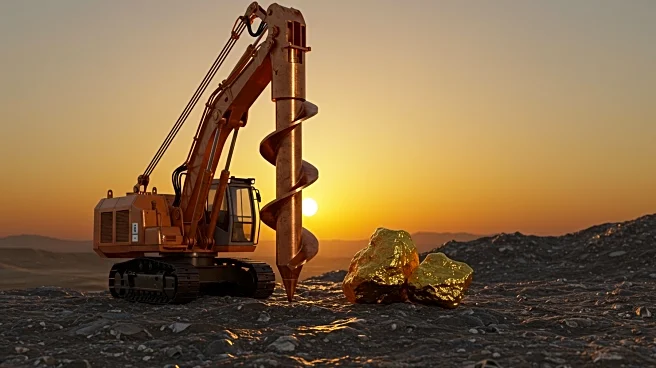What's Happening?
Barrick Mining is pursuing $3.5 billion in funding from G7 nations to develop a copper-gold mine in Balochistan, Pakistan. The company aims to establish the Reko Diq mine, which is anticipated to begin production by 2028. This initiative follows Saudi Arabia's refusal to finance the project. Barrick's CEO, Mark Bristow, has indicated that several financial organizations, including the U.S. Export-Import Bank and the U.S. International Development Finance Corporation, are involved in negotiations. The Reko Diq deposit is one of the world's largest undeveloped copper-gold projects, expected to generate significant cash flow over its 37-year lifespan. The project is jointly owned by Barrick Gold, the federal government of Pakistan, and the provincial government of Balochistan.
Why It's Important?
The development of the Reko Diq mine could have substantial economic implications for Pakistan, potentially boosting its mining sector and providing significant revenue. However, the project also raises concerns about the exploitation of Balochistan's natural resources, with local communities historically marginalized and deprived of benefits. The involvement of U.S. financial institutions suggests a strategic interest in the region, possibly influenced by geopolitical dynamics, including Pakistan's relationship with President Trump. The designation of the Balochistan Liberation Army as a terrorist organization by the U.S. further complicates the situation, highlighting tensions between local resistance groups and foreign interests.
What's Next?
The next steps involve securing the necessary funding from G7 nations and other financial entities to commence the Reko Diq project. Stakeholders, including the Pakistani government and Barrick Mining, will need to address local opposition and ensure that the benefits of resource extraction are equitably distributed. The geopolitical implications of U.S. involvement in Pakistan's mining sector may also influence future diplomatic relations and trade agreements, particularly in light of ongoing tensions with India.
Beyond the Headlines
The exploitation of Balochistan's resources by foreign companies raises ethical concerns about the rights of indigenous communities and the environmental impact of large-scale mining operations. The historical context of resource diversion from Balochistan to other provinces in Pakistan underscores the need for equitable resource management. Additionally, the geopolitical maneuvering by the U.S. and Pakistan could have long-term implications for regional stability and international relations.









